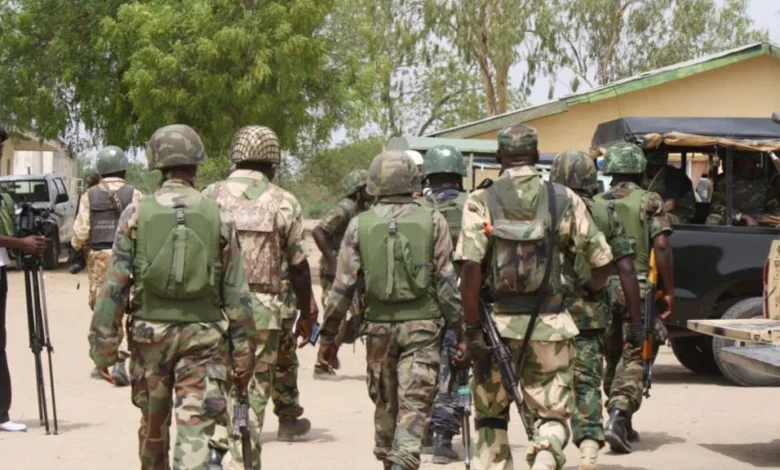Nigerian Army Arrests “Gentle de Yahoo” — Full Report

The Nigerian Army says it has arrested Ifeanyi Eze Okorienta, popularly known as “Gentle de Yahoo”, described in multiple reports as a commander of the Indigenous People of Biafra (IPOB) and the Eastern Security Network (ESN). The operation reportedly took place at a hideout in Aku-Ihube, Okigwe Local Government Area, Imo State, and involved troops from the 34 Artillery Brigade working with sister security agencies. Security forces say they recovered arms, uniforms, phones and other items, and that coordinated operations in other states led to rescues and other seizures. 0
What the Army Reports
According to official statements relayed to the press, troops from the 34 Artillery Brigade executed an operation at a hideout in Aku-Ihube, Okigwe LGA where they apprehended Ifeanyi Eze Okorienta (Gentle de Yahoo). The Army’s account lists the recovery of weapons and ammunition — including an English pistol, multiple rounds of 7.62mm ammunition, mobile phones, and clothing resembling military and police uniforms. The operation was described as a joint effort with other security agencies. 1
Several national and regional outlets report that the arrest was part of a broader set of operations in which troops also claimed to have rescued kidnap victims and neutralised suspected militants in other states. These coordinated actions were highlighted by the military as part of an intensified security drive across several regions.
What Was Seized — Reported Evidence
- Firearm reportedly described as an English pistol.
- 120 rounds of 7.62mm “special” ammunition and 25 rounds of 7.62mm NATO ammunition.
- Mobile phones (six reported).
- Military and police-style uniforms (alleged).
- Other items reported include a German flag and tools used for vehicle dismantling. 3
In the same wave of operations the Army says it discovered a workshop allegedly used for dismantling stolen vehicles and destroyed a number of motorcycles found at hideouts. Local reports also say troops recovered and returned stolen cattle in some areas.
Who Is “Gentle de Yahoo”?
Media reports and social conversations identify Gentle de Yahoo as a local commander associated with IPOB/ESN activities in parts of the South-East. He had featured in widely circulated videos and online discussions which alleged brutal acts by men identified as members of the group. Those clips and the notoriety they generated made him a high-profile target for security agencies. Local message boards and social networks carried both allegations and footage purportedly showing his men in violent incidents prior to this arrest.
Note: Names and aliases in conflict zones are often fluid, and verification can be difficult without official court records or independent investigations. Media outlets here rely largely on military statements and eyewitness accounts.
Timeline — How the Story Unfolded
Morning / Early Report: Local and national outlets began publishing breaking notices that the Army had arrested a high-profile IPOB/ESN figure following an operation in Imo State. Many of the first reports drew directly on the Army’s situational releases or on statements from field commanders. 6
Follow-up Coverage: Within hours, additional stories compiled corroborating detail — the location (Aku-Ihube), the brigade involved (34 Artillery Brigade), and the list of seized items. Several outlets also connected the arrest to separate but simultaneous security actions across multiple states where military units reported rescues and seizures. 7
Social Media & Public Reaction: Images and short videos began circulating on X (Twitter), Facebook and messaging apps. Some social posts celebrated the arrest; others warned that the situation might provoke retaliation or spur unrest in nearby communities. As with many breaking events, unverified material also proliferated — highlighting the need for careful source checking. 8
Immediate Reactions
Government & Security Agencies
The Army’s public relations channels framed the arrest as a success for intelligence-led operations. Statements focused on the items seized and the alleged criminal activities linked to the suspect, and emphasised that the operation demonstrated improved inter-agency coordination. Official statements typically promise follow-up investigations and, in some cases, prosecution where legal thresholds are met. 9
Local Community
Reactions in the immediate locality were mixed: relief among residents tired of insecurity; fear among those who worry about reprisals; and anger among people who distrust any heavy military presence. Posts on neighbourhood fora and messaging groups reflected these mixed emotions. Independent reporting in the aftermath of such arrests often shows a spike in community consultations and local security meetings. 10
IPOB/ESN & Sympathisers
At the time of initial reports some channels associated with pro-IPOB voices either called for calm or questioned the veracity of the capture, hinting that misinformation was possible. Historically, separatist movements use both official and grassroots channels to frame events in ways that support their narratives — either denying losses or calling for mobilization. Given the speed of modern social media, expect competing narratives to emerge. (See: coverage of similar incidents in recent months.) 11
Why This Matters — Strategic and Political Implications
Operationally: Capturing a high-value local commander — if verified — can produce immediate tactical advantages: intelligence from the suspect or seized devices that help map networks, identify caches and reveal logistics chains. The Army’s recovery of phones and uniforms, if authenticated, could yield actionable leads for further operations. 12
Symbolically: Arrests of prominent insurgent figures are frequently used as proof of progress by security agencies. Politically, the federal government and military may highlight such operations to show effectiveness in the face of criticism about insecurity. However, symbolic victories do not automatically translate into long-term stabilisation unless accompanied by governance, rule of law and community reconciliation. 13
Risks & Possible Backlash: Arrests can provoke attempted reprisals, splintering of militant groups into more radicalised cells, or intensification of violence if the arrested figure enjoys local support. Human rights organisations also monitor such operations closely because arrests in conflict settings have in the past been accompanied by allegations of extrajudicial treatment or abuses. Maintaining transparency, prompt legal process and access to independent monitors reduces those risks. 14
Legal and Human Rights Considerations
It is essential that after any arrest, suspects are afforded due process under Nigerian law. International and local rights groups regularly call for:
- Prompt charge and arraignment where evidence exists.
- Access to legal counsel and family notification.
- Independent medical checks if mistreatment is alleged.
Past cases involving high-profile separatist leaders have sometimes raised questions about rendition, detention conditions, and fair trial standards — issues that can inflame tensions if not transparently managed. Observers will therefore be watching how the authorities process the arrested individual. 15
What To Watch Next
- Official confirmation and charges: Will military authorities hand the suspect over to civilian prosecutors, and what charges will be filed (terrorism, kidnapping, unlawful possession of arms, etc.)?
- Forensic analysis of seized items: Will phones and other materials be forensically examined and will the results be shared with the public or relevant oversight bodies?
- Community response: Monitor Imo State and neighbouring areas for protests, reprisals, or increased military activity.
- IPOB/ESN statements: Watch for official or unofficial reactions from separatist channels — denial, calls to action, or claims that the arrested person was not a commander.
- Independent reporting: Trusted independent journalists and rights organisations may publish follow-up investigations into the arrest and treatment of the detained person.
Expert Analysis — Short Commentary
From a security studies viewpoint, arrests of mid-level commanders are part of the standard counter-insurgency playbook: remove leadership, disrupt logistics, and leverage intelligence from detainees. Yet experience from many conflicts shows that removing a single commander rarely ends a movement. Sustainable progress requires addressing the underlying social and political grievances, cutting off external supplies of arms and funding, and strengthening local policing and justice systems. Without this broader approach, arrests can create short-term gains and long-term instability.
Final Thoughts
The reported arrest of Gentle de Yahoo — if substantiated by transparent legal steps and independent verification — could yield important leads for security agencies and offer temporary relief in affected localities. But arrests are only one part of a much larger equation: sustainable peace requires accountable security practices, community engagement, and long-term political solutions that address root causes.
We will continue to follow this story and update this article as more verified information becomes available, including official charges, forensic results from seized items, and credible independent reporting on the ground.




